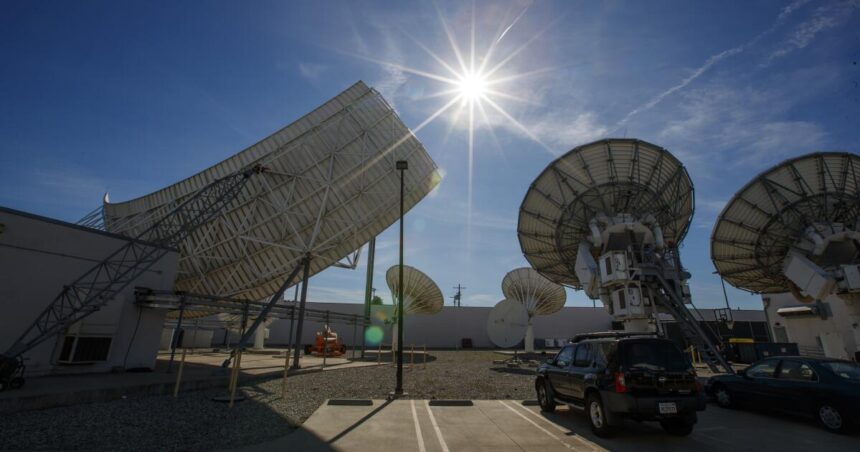After a 13-day blackout, The Walt Disney Company and DirecTV settled a contract dispute early Saturday, restoring ESPN, ABC stations and other Disney-owned channels to more than 10 million DirecTV subscribers.
DirecTV and U-Verse customers are frustrated by the loss of Disney programming since negotiations collapsed.
The two companies were eager to reach an agreement before another weekend of college football kicks off on ESPN and ABC, ABC’s telecast of the 76th Emmy Awards on Sunday and the second week of ESPN’s “Monday Night Football,” which will feature ABC’s game against the Philadelphia Eagles and the Atlanta Falcons. ABC’s new primetime season also begins later this month.
The nearly two-week battle has taken a heavy toll: DirecTV acknowledged earlier this week that thousands of subscribers had canceled their service during the outage, as the satellite TV giant hoped to stop the bleeding.
After lengthy negotiations, the two companies announced they had reached a “broad agreement” that includes increasing the amount DirecTV will pay for Disney programming. Earlier this week, DirecTV warned subscribers that it plans to raise prices on some of its bundles next month due to rising programming costs.
DirecTV also won with the new deal. It can now offer the Disney Channel in its genre packages, including sports, general entertainment and the “Kids & Family” package. DirecTV can also offer Disney’s streaming services (Hulu, ESPN+, Disney+) on an a la carte basis to customers who subscribe to certain packages, which will include Disney’s upcoming ESPN streaming service that will launch next year.
“Through this first-of-its-kind partnership, DirecTV and Disney will give customers the ability to customize their video experience through more flexible options,” the companies said in a joint statement. “DirecTV and Disney have a longstanding history of connecting consumers to the best entertainment, and this agreement furthers that commitment by recognizing both the tremendous value of Disney’s content and the evolving preferences of DirecTV customers.”
The controversy has highlighted the strain that traditional pay-TV distributors face amid the shift to streaming.
As the major bundles’ subscriber bases shrink, they are increasingly being asked to cover higher programming costs.
The costs of operating broadcast channels (ABC, CBS, Fox, NBC) and sports networks, including ESPN, are rising, as programmers try to pass on increases in fees they have agreed to pay to sports leagues. ESPN is the most expensive basic cable channel, costing pay-TV distributors nearly $10 per subscriber household per month.
Sports costs have been a major sticking point in the recent dispute. Another sticking point has been Disney’s requirement that its channels be available in most homes on DirecTV and U-Verse.
Disney has long required its channels to reach about 90% of DirecTV’s subscriber base; ESPN’s minimum standard is about 82%.
Pay-TV companies like DirecTV must pay a fine if they fail to meet that “minimum penetration rate.”
Heading into the negotiations, DirecTV prepared for battle with the goal of loosening those barriers: DirecTV wanted the requirements relaxed so it could offer customers smaller, genre-themed bundles at lower prices.
DirecTV executives argued that it was unsustainable to force customers to buy “bloated bundles” filled with expensive channels they never watch, and that most consumers watch fewer than 30 channels.
Disney countered that programming is expensive to produce and that it invests heavily in high-quality content.
Neither side was willing to drag out a protracted battle that pitted customers against each other: More than 4 million U.S. households have already dropped pay-TV in the first half of this year, according to research firm MoffettNathanson.
Disney and DirecTV still make billions of dollars from traditional pay-TV packages, and they want to keep that tap running. Disney receives about $2 billion a year from DirecTV, according to MoffettNathanson.
Unlike cable distributors, which also offer high-speed Internet and phone service, DirecTV has focused solely on selling video channel packages, including U-Verse, since the company was founded. Having lost more than half its subscribers from a decade ago, El Segundo couldn’t afford to turn away any more customers and began offering $30 credits to encourage them to stay during the blackout period.
Disney signaled early on that it wanted to work with DirecTV to create genre-themed bundles including kids and family entertainment, local stations and sports.
“Disney openly talking about mini-bundles marks a major strategic shift and is likely indicative of where the industry is ultimately headed,” Rich Greenfield, media analyst at LightShed Partners, said in the report.
But the two companies have been haggling for days over penetration rates, and negotiators have spent long hours trading proposals since the blackouts began, despite publicly exchanging excuses.
Blackouts are becoming more common as industrial economies decline. The Disney Channel hit a deadlock last year amid a similar fight over fees and flexibility to offer its streaming service to customers at no extra cost.
Executives at Charter, DirecTV and other distributors have bristled at efforts by Disney to offer its programming directly to consumers, bypassing distributors, as the company plans to roll out ESPN as a streaming service next year.
The Burbank giant has also partnered with Warner Bros., Discovery and Fox Corp. This year it plans to offer a $43-a-month package of sports channels called Venu. But last month a federal judge issued a temporary injunction.
Distributors see such services as a direct threat to their business.
DirecTV Chief Content Officer Rob Toon also said Disney’s general counsel had asked DirecTV to release legal claims against Disney alleging antitrust conduct as part of the distribution deal, which also became a sticking point during the negotiations.
DirecTV filed a complaint with the Federal Communications Commission last weekend alleging that Disney is not negotiating in good faith and that its tactics are anti-competitive.









